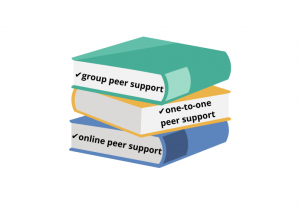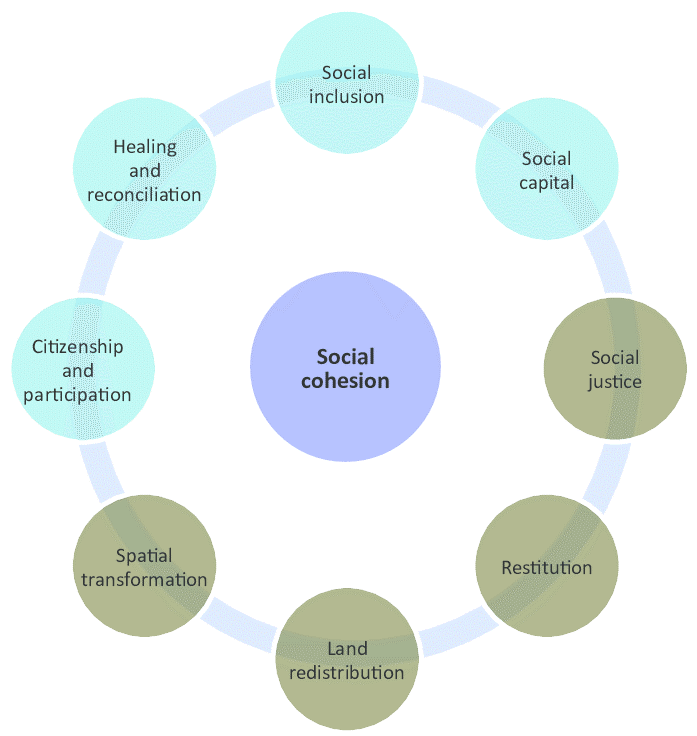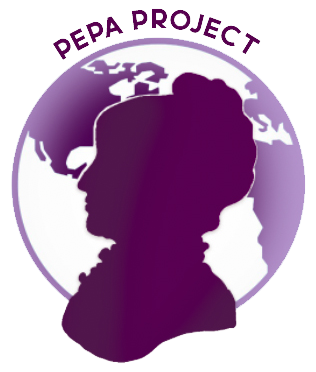Module 1
WHAT IS PEER SUPPORT?
Introduction
Peer support has many benefits for women. It is a form that unites women, giving them the strength to change their situation and help these women in their integration process.
This module provides information on what peer support is and how migrant women can benefit from this kind of support. This module will also contribute to the understanding of the significance of social and economic integration of migrant women to facilitate smooth and hassle-free functioning in the given community.
Our aim is to bring organisations working with migrant women closer to this concept and provide useful references.
Objectives
- To become familiar with the term of peer support.
- To expand knowledge of the benefits from peer support programmes.
- Greater ability to correlate social and economic factors on the functioning of migrant women in the community.
- Deeper understanding of the importance of integration of migrant women and their families into the society.
Duration & Requirements
Approximate reading time for the module, without taking the indicated resources into consideration, is about 2 hours.
The learners don’t need to have any particular knowledge or skills. The learners will need a computer with an internet connection and sheet of paper and a pen to take notes.
It is advisable that the learners have an insight into the reference material and delve into the information provided.
Content
Peer support can enhance personal development and provide relevant information that cannot be obtained in any other way. Peer support also provides a way to address personal and complex problems. It is effective in reaching, educating and supporting the most vulnerable people.
It is through the development of meaningful, two-way relationships that peer support works. People can feel less alone if they talk about their experiences and share coping strategies that work for them. By doing this, peers can help each other learn about how best to manage feelings and experiences that are difficult.
Peer support can promote pride, satisfaction and feeling some kind of commonality with another person. Peer-to-peer activities offer vulnerable people the opportunity to give back to their community, develop a sense of purpose and a greater sense of identity.
Finally, peer support activities also benefit organisations and the community. The public can form a more positive image of migrant women living independently and increase their interaction with them.
Integration is not a one-size-fits-all endeavor. Approaches to integration vary according to where a State’s integration policy lies between the poles of assimilation and multiculturalism.
Moreover, the components of integration and social cohesion policies also differ depending on the type, duration or purpose of migration. The common denominator is that integration is a process that contributes to stable and inclusive societies. Whether for temporary migration purposes or permanent settlement, the risks and costs of non-integration far outweigh the initial investment needed to support integration. Developing effective integration measures requires sufficient political, social, and financial investments to achieve tangible long-term benefits for all.
This module aims to define what, in fact, peer support is, to describe benefits of any peer support programme and to fully understand the process of integration of migrants into the society.
What is peer support?
Peer support happens when people who have similar experiences of something difficult come together to support each other. For the purpose of this module, we are talking about experiences of migrant women, their individual stories and any cases of emotional distress they went through. However, people involved in peer support may also have other shared characteristics, experiences, and interests.
Crucially, the people involved play an active role in creating a safe environment for each other. In this space, people can use their shared experiences to give and receive support from each other. Peers make choices about what parts of their personal experiences they talk about, seek support for, and use to support other people.
Peer support is very flexible. It can be tailored to both the people who are part of it and the local community where it takes place. There are three broad approaches to peer support:

- group peer support
This involves three or more people coming together to support each other. There are many ways of doing this, from groups that allocate a number of official roles and run structured activities, right through to lose, informal gatherings.
- one-to-one peer support
This involves two people who support each other. This may be in a very informal context, for example two friends coming together to talk about a shared problem. In some cases of more formally organised one-to-one peer support, one person may have had some training, for example in mentoring skills. One person may also be further along their ‘mental health journey’. This may mean that one person may provide more support to the other at times.
- online peer support
People may access peer support online, often through websites that are designed specifically to facilitate peer support. Peers may also use generally available social media forums that are open to anyone. Online forms of peer support are different from face-to-face approaches because they usually allow people to access support at any time they need, including in the middle of the night, and for as much or as little time as is necessary. They also allow people to remain anonymous if they choose
However, the practical advice raised in this module will be more easily applied to face-to-face settings than online, as migrant women need face-to-face contact in the process of establishing mutual rapport and good relationships.
What are the benefits of peer support programmes?
The peer‐to‐peer awareness comes from the concept of Peer Education, defined as "the teaching or sharing of information on health, values and behaviors, by members of the same age and with a similar social status” referring to the concept of communication between peer and peer or between people belonging to the same status and is therefore inherent to phenomena of social influence.
Feeling some kind of commonality with another person or supposing to share with them the same problems or experiences make this person a credible interlocutor, that can be trusted, and this increases the probability that our way of thinking and acting is influenced by it.
Data from national analyses show that peer social influence is very strong in the case of migrant communities living in Europe and especially in women.
PEER-TO-PEER SUPPORT BENEFITS:
- exploitation of the relationship of mutual and continuous influence that manifests itself within a peer group to make shared knowledge;
- collaboration and sharing knowledge and competences between individuals who identify themselves as similar in age, education, previous experience etc., thus triggering Peer-To-Peer interaction;
- exploitation of the dynamics existing within a group to be able to reach, in a direct way and using the language typical of the group itself, the highest number of people possible in order to generate a real change;
- triggering a reflection in the behavior of individuals and in the acquisition of knowledge;
- boosting self-confidence within individuals;
- increased communication skills, as well within the group as beyond it;
- greater ability to integrate knowledge, skills and personal experiences;
- greater flexibility and adaptability to rapid changes in a given environment/ society;
- increased Peer-To-Peer Awareness of the benefits of such programmes in any field;
- becoming awareness Ambassadors in the given topic through encouraging community members to reflect on the importance of sharing given knowledge and experience with their peers.
From a psychological point of view, it is scientifically proven that the peer group plays an essential role in supporting the creation of the individual and his growth as a member of the community. From birth, the peer group is in fact seen as a mirror through which they reread their experiences and, in this way, on the one hand, acquire different kinds of knowledge and skills and, on the other, change their behavior and attitudes. This process is stimulated by the exchange of ideas and the sharing of experiences, following the analysis of individual and/or common problems and the search for possible solutions.
How do social and economic factors influence migrant women's existence and integration into the given community?
Integration is defined as the two-way process of mutual adaptation between migrants and host societies in which migrants are incorporated into the social, economic, cultural and political life of the receiving community. As such, integration entails a set of joint responsibilities for migrants and host communities, and, in this broad understanding, incorporates other related notions such as social inclusion and social cohesion. Integration is a cross-cutting and multi-sectoral issue that pertains to policy areas that address the economic, social, legal, cultural, and civic spheres and impacts all aspects of migrants’ lives and their communities.
Social inclusion means facilitating access to health, education, labour market and financial services. It also means civic and political participation. Social cohesion is even a more inclusive notion, referring to strong attitudes of anti-discrimination, countering xenophobia and promoting mutual understanding.

The paths of women and men toward integration may face differing obstacles due to societal expectations and prejudices regarding their perceived roles in society both in the country of origin and of destination. In addition, discrimination in public institutions as well as xenophobic attitudes and abuse from local communities is an obstacle to successful integration.
People tend to overestimate levels of immigration into their countries, often believing that migrants and refugees are a burden on, rather than contributors to, their economies. Such misperceptions feed xenophobic sentiment while hindering migrants’ and refugees’ integration and opportunities to contribute to the recipient societies.
STEPS TO BE TAKEN IN ORDER TO INTEGRATE MIGRANT WOMEN INTO THE SOCIETY
- Pre-departure and post-arrival orientation programmes are designed to prepare migrants, including migrant women and their children for their arrival and facilitate their integration into host communities by managing their expectations and providing information about their rights and responsibilities, the country’s culture and customs, as well as information about education, health care, also for their offspring, and employment. These activities help equip migrant women with the knowledge, skills and attitudes needed to overcome the challenges of a new culture.
- Engagement with the private sector to facilitate labour market access. The private sector can serve not only as a potential employer of migrants but also as a committed partner in formulating vocational and language training for its workforce. It can also provide knowledge on national and local labour markets to assess labour market needs and identify key areas for employment of migrant women. Businesses that acknowledge the value of diversity by integrating it into their workforce and institutional culture can be influential actors in shaping perceptions about migrants.
- Engagement with receiving communities and local authorities aims to educate and empower all members of society, not just migrants, about the integration process. Capacity building programmes for local communities consist of training and information sessions on topics such as the cultural profiles of migrants, including migrant women and their families, as well as information gathered through needs assessment surveys conducted at the pre- departure stage.
- Engagement with the media and other actors to highlight the positive contributions of migrants consists of innovative partnerships between intergovernmental organizations, governments and communicators, which foster a balanced and evidence-based reporting of migrant issues. Campaigns which aim to address the negative perceptions of migrants by host societies can be developed jointly by governments, the media and NGOs. Other impactful initiatives consist of campaigns that offer a platform or assistance for migrants to:
- tell their own stories by helping them develop skills such as filmmaking and digital storytelling (sharing their stories/ experiences in public thus sensitizing the society),
- set up their own businesses in which it is manageable for migrant women to take care of their children,
- initiate volunteer programs to assist pregnant women and their infants (women and infants represent a majority of migrants and pregnancy can make women more vulnerable),
- hire/ send interpreters or babysitters during job interviews of migrant women, etc.
Inspiration:
- Empowering refugee women in Indonesia through sisterhood: https://www.youtube.com/watch?v=8IHTWQlLYHo
- What is SisterWorks: https://www.youtube.com/watch?v=7WenWkATFOY
- Multicultural Peer Mentorship for Professionals @ CFN: https://www.youtube.com/watch?v=_-0IlthN8t4
- Inspirational Stories - Milia Simieli, Mentor: https://www.youtube.com/watch?v=zAvDSwcbgfQ
Summary
In this module we define the notion of peer support. We bring the potential readers closer to the benefits from any peer support programmes. We also highlight how important social and economic factors are so as to integrate migrant women into the host society.
We recommend that you consult the information included in this module, as it will be relevant to your training on this topic, or keep this guide as a resource for other activities or your personal inspiration.
Learning Outcomes
By the end of this module you will be able to:
- define what peer support is;
- recognise how you can benefit from a peer support programme;
- interpret the role of Peer-To-Peer awareness Ambassador;
- understand how important social and economic factors are in order to fully integrate migrant women into the society.
Self-assessment
Suggested resources
- Side by Side Research Consortium (2017) Developing peer support in the community: a toolkit. London: Mind.
https://www.mind.org.uk/media-a/4247/peer-support-toolkit-final.pdf
- Peer-to-peer Approaches for Migrant Women
https://medlitproject.eu/wp-content/uploads/2020/02/IO3_EN_V2.pdf
- Integration and Social Cohesion: Key Elements for Reaping the Benefits of Migration; International Organization for Migration
https://www.iom.int/sites/g/files/tmzbdl486/files/our_work/ODG/GCM/IOM-Thematic-Paper-Integration-and-Social-Cohesion.pdf
- InfoMigrants
https://www.infomigrants.net/en/post/34536/helping-migrant-mothers-to-give-their-babies-a-healthy-start
- McKinsey Global Institute, People on the move: Global migration’s impact and opportunity (2016) Available from: http://www.mckinsey.com/global-themes/employment-and-growth/global-migrations-impact-and-opportunity
References
- Volunteering Charter. European Charter on the rights on responsibilities of volunteers - https://ec.europa.eu/citizenship/pdf/volunteering_charter_en.pdf
- Volunteering and its Surprising Benefits, https://www.helpguide.org/articles/healthy-living/volunteering-and-its-surprising-benefits.html
- ProVol, Promovăm voluntariatul – Harta voluntariatului în județul Suceava (engl. Volunteering promoters – The map of volunteering in Suceava County) – printed by ACDC Romania Association
